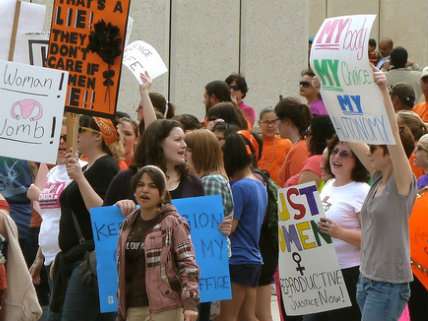Abortion Rights Back Before the U.S. Supreme Court This Week
Whether the Court will rule against Texas abortion-clinic regulations will likely come down to Justice Anthony Kennedy.

The Supreme Court must go on, despite the death of Justice Antonin Scalia and the controversy surrounding his replacement. And on Wednesday, it will consider a Texas abortion law that opponents say unconstitutionally infringes on abortion access and supporters say was designed to protect women's health. With states across the country enacting similar laws, the outcome of this case could have huge implications for abortion clinics across America.
The Texas law, passed in 2013, says that abortion-clinic doctors must have an admitting-privileges agreement with a nearby hospital and that clinics must meet the same building standards as surgical centers, even when no surgical abortions are performed there. Since it took effect, the number of legal abortion clinics in the state dwindled from 40 to 19. If the regulations are upheld, at least nine more clinics in Texas are expected to close.
The Center for Reproductive Rights (CRR), a nonprofit legal advocacy group, is leading the Supreme Court challenge on behalf of Texas abortion clinic Whole Woman's Health. (For more background on the case, see here and here.) It maintains that despite the pro-woman rhetoric of the law's architects, the real purpose of the regulations is to shutter abortion clinics. As such, it would violate the Supreme Court's decision in Planned Parenthood v. Casey.
In that 1992 case—viewed by some as the case that "made a mess of abortion rights" in America—the Supreme Court held that states cannot pass "unnecessary health regulations" with the "purpose or effect of presenting a substantial obstacle to a woman seeking an abortion." This sort of "undue burden," the Court held, would represent a violation of the right to an abortion affirmed under Roe v. Wade.
"When the court holds oral arguments in Whole Woman's Health v. Hellerstedt this week," notes Nina Martin at Mother Jones, "the signs that protesters wave and the chants they chant will likely focus on Roe, but the outcome of the case will hinge on how justices interpret Planned Parenthood v. Casey."
Liberal Justices Ruth Bader Ginsburg, Stephen G. Breyer, Sonia Sotomayor, and Elena Kagan are all expected to be sympathetic to CRR and the abortion clinics. Meanwhile, Chief Justice John Roberts and Justices Samuel Alito and Clarence Thomas are expected to side with the state.
That means that Justice Anthony Kennedy will be need to be persuaded to CRR's side for it to be victorious. And how Kennedy will go is uncertain. He's one of two current Justices, along with Thomas, to have heard Planned Parenthood v. Casey. In that case, Pennsylvania abortion regulations related to informed consent, a 24-hour waiting period, and parental notification for minors were upheld while a section requiring married women to attest that their husbands knew about the abortion was struck down.
Justices Thomas, Scalia, Byron White, and William Rehnquist favored upholding all of the regulations. But Kennedy joined liberal justices Harry Blackmun and John Paul Stevens and fellow moderates Sandra Day O'Connor and David Souter in favor of striking down the spousal notification rule.
Yet many interpreted the plurality opinion from Kennedy, O'Conner, and Souter as support for upholding judicial precedent, not necessarily belief that the precedent set by Roe was right. In many respects, their opinion "took Roe v. Wade apart, starting with its foundation, the trimester framework," writes Martin.
Under Roe, states were almost completely banned from regulating abortion during the first trimester. They had more flexibility to pass laws protecting a woman's health in the second trimester, and they could prohibit most abortions in the third. In contrast, Casey declared, "[T]he State has legitimate interests from the outset of pregnancy in protecting the health of the woman and the life of the fetus that may become a child." Instead of the trimester approach, Casey established viability—the point at which the fetus can survive outside the womb—as the new reference point for determining whether an abortion law was valid or not. (When Roe was decided, fetuses weren't considered viable until 28 weeks, or the third trimester; by 1992, medical advances had pushed the line to around 24 weeks.) Before viability, Casey said, states could only try to persuade a woman not to have an abortion; laws that made it difficult or impossible for her to act on her decision did not pass muster. After viability, though, states could restrict abortions pretty much however they liked.
More significantly, Casey also rejected Roe's "strict scrutiny" test for evaluating abortion restrictions—a test that had stymied most state efforts to regulate the procedure—replacing it with the looser "undue burden" standard, which Justice O'Connor had proposed in dissents to earlier abortion rulings. An undue burden was defined as any law that had "the purpose or effect of placing a substantial obstacle in the path of a woman seeking an abortion." Importantly for the pending Texas abortion case, this reasoning applied to medical rules as well as other restrictions: Although "the State may enact regulations to further the health or safety of a woman seeking an abortion," the court held, "unnecessary health regulations that have the purpose or effect of presenting a substantial obstacle to a woman seeking an abortion impose an undue burden." Still, the court reiterated, just because a law had "the incidental effect of making it more difficult or more expensive to procure an abortion" wasn't enough to invalidate it.
Justice Kennedy was not among the justices (Scalia, Thomas, and Alito) who spoke out against an unsigned 2014 order that temporarily blocked the Texas regulations.
The last big Supreme Court decision on abortion was in 2007, when the Court upheld a federal ban on intact dilation and extraction procedures, more commonly known as "partial birth abortion." In this case, Kennedy sided with Scalia, Alito, Roberts, and Thomas in support of the ban.


Show Comments (10)